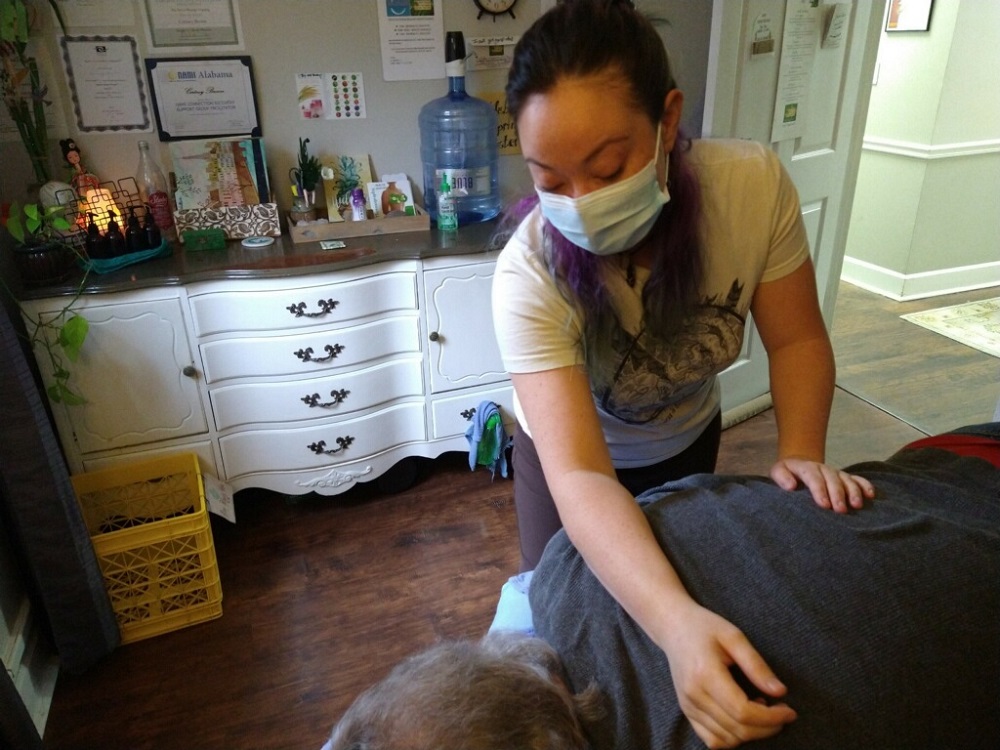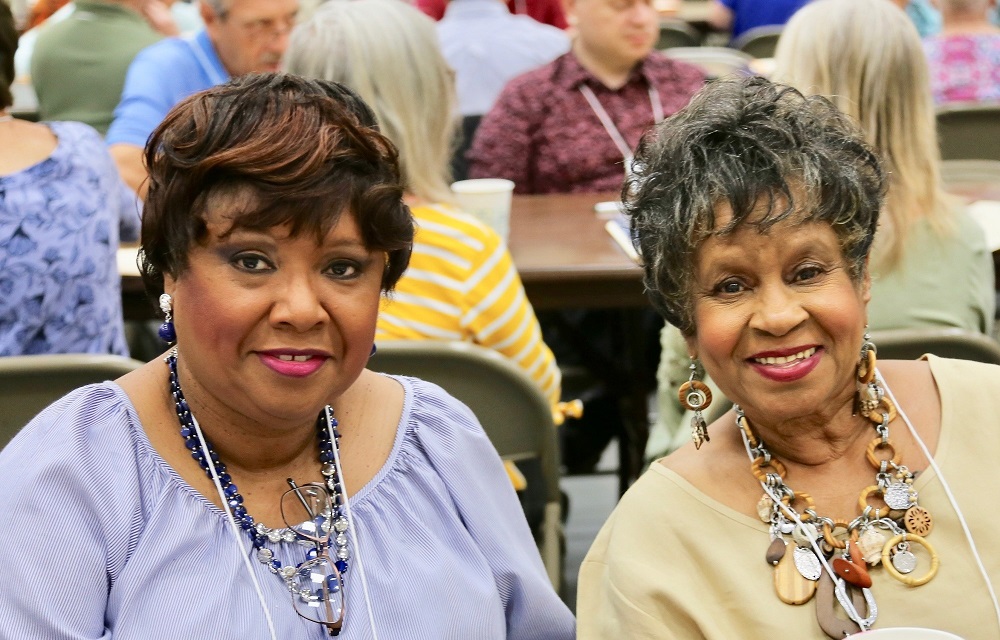
Photo by Beth Young
Cortney Brown is a licensed medical massage therapist who falls in the “coverage gap,” meaning she earns too much for Medicaid but too little for private insurance.
A few years ago, Cortney Brown was playing soccer with her brother and a group of kids at a Caribbean festival in Huntsville, Alabama, when she felt a pang in her abdomen, then a pop.
She looked down and a puslike substance was coming out of her belly button.
“Everyone was freaking out,” said Brown, a 32-year-old licensed massage therapist and small business owner, with a laugh, acknowledging the awkwardness of sharing such an intimate story.
She’s one of 400,000 working Alabamians who fall into a “coverage gap,” meaning she earns too much to qualify for Medicaid but too little to afford private insurance.
[Related: Alabama’s Essential Workers Lack Access to Basic Health Care, Services, Report Says]
Brown was born with the birth defect gastroschisis, a rare condition in which a newborn’s intestines extend outside the abdomen through an opening near the belly button. Despite surgical correction, she’s still at high risk of life-threatening infections.
When she felt that pop on the soccer field, she knew the old scar tissue might have torn. Without insurance, she had no primary care physician to call. She dialed a few registered nurse hotlines; all recommended she go to the ER.
“Everyone kept telling me to go to a hospital,” Brown said. “I didn’t. I couldn’t afford it.”
So, she waited. She knew people might judge her decision, but an emergency room visit and the resulting follow-ups and medications might have cost her entire savings, possibly more.
“I kept reading about ‘affordable health care’ during that time and thought, ‘What a concept!’” Brown said. “Wouldn’t that be spectacular? For no one to go bankrupt for choosing to value their life.”
Politics, shame are factors
A dozen others in similar situations were interviewed: a middle-aged white laborer who was counting the days until he was old enough to qualify for Medicare, a young Black mother who said doctors treated her differently after she lost her insurance when she was laid off during a company downsizing and was now reliant on freelance work that used to be her “side hustle.” None were comfortable publicly sharing stories that can be personally traumatic and culturally stigmatized — even though recent polls show the majority of voters in the state favor Medicaid expansion, which would provide coverage to more than half of those currently uninsured.
But despite widespread bipartisan support, a “bootstrap ethic” often silences those who work hard but can’t get health insurance, as one organizer with a health care coalition, Cover Alabama, put it. A project of the nonpartisan nonprofit Alabama Arise, Cover Alabama includes a network of more than 100 organizations, businesses and faith groups advocating for sustainable health care for all Alabamians.

Alabama Arise Facebook
Members at the Alabama Arise annual meeting in 2019.
In February, the group published a report that outlined the need for expansion beyond the existing weak safety net for all working people, which was made worse by COVID-19. According to the report, 62.2% of Alabama’s white workers had health insurance through their jobs before the pandemic, versus only 46.4% of Black workers and just 35.5% of Hispanic/Latinx workers. But even within those previously insured groups, Alabamians working in low-wage industries suffered disproportionate job losses, while unemployment insurance has left even more out of coverage.
This legislative session, Brown is joining activists as they advocate for Medicaid expansion — yet again. For years, the Republican-majority Legislature has opposed expansion, disregarding reports from the state’s leading public health experts who have outlined the benefits for public health and the economy. They’ve also ignored evidence from Southern states where expansion was similarly delayed but has now become a budget boon, not a loss, as conservatives have long warned. And they’ve silenced ordinary people like Brown.
Meanwhile, critics say the continued stubbornness of lawmakers is an anti-President Barack Obama political dog-and-pony show and, importantly, is now out of step with voters.
Governors stand against expansion
When the Affordable Care Act passed in 2010, Medicaid expansion was supposed to close the gap.
And it has — in the 39 states that have since adopted expansion. Of the 11 holdouts, most are neighbors of Alabama in the deep South.
When former Alabama Gov. Robert Bentley, a Republican and dermatologist, first denied expansion in 2012 by turning down the federal government’s offer to fully pay for the program for three years, he did so against his own advisers’ urging. Faith and business leaders criticized the decision, calling expansion a “moral issue” in a state burdened by poverty and a crumbling health care infrastructure.
Since stepping in for Bentley after he resigned amid scandal, Gov. Kay Ivey, a Republican, has repeatedly asked how the state would fund the program once federal support was phased out. Meanwhile, Alabama’s health outcomes have only gotten worse: Seventeen rural hospitals here have closed in the last decade.
As expansion discussions began again last year — in the middle of the COVID-19 pandemic — Ivey said passing expansion would be “irresponsible.”
‘A real sea change’
For a decade, expansion had been unpopular with conservative voters too, in part because of its ties to the Democratic former president and the program many still call “Obamacare.” But that’s changed. Now, more than half the state’s Republican voters support expansion; in households earning less than $80,000 per year, the number jumps to 70%.
“There’s been a real sea change,” said Jane Adams, the campaign director of Cover Alabama.
And Medicaid expansion will do more than expand Medicaid, she said. Expansion will also create potential pathways for individuals to get private insurance and fund programs to tackle public health crises in a state where crises abound. Alabama had the third highest rates of hospitalizations for COVID-19 in January. The state has disproportionately poor outcomes for Black mothers and babies, a crumbling infrastructure for mental health care and a population that is trending both older and sicker.
Adams said Republican lawmakers have told her in private conversations they know expansion is needed, but that they won’t say so in public. “They’ll say ‘rural health care’ or ‘maternal health,’ those types of things,” she said. (None of those lawmakers agreed to an interview for this story.)
Last year, House Ways and Means General Fund Committee Chair Steve Clouse said he could see expansion moving forward if a funding source “can be identified and we can enact it.”
Now, the federal government is offering to pay 90% of expansion costs. Polling from Cover Alabama shows voters favor increasing the state tobacco tax or legalizing and taxing medical marijuana — all of which are in consideration this legislative session, scheduled to end May 30. Other Southern states have seen a boost to their economies after adopting Medicaid expansion. Because of that revenue boost, Arkansas and Virginia had savings in their budget.
Plus, Adams said, Alabamians have already paid $4 billion in federal taxpayer money toward Medicaid expansion — without getting the benefit here.
“So, the question isn’t about whether or not we can pay for it,” Adams said. “The question is: Are we going to prioritize it?”
Debt or health
Brown started working in massage therapy because she wanted to help people.
“It’s hands-on care, literally,” she joked.
She owns Panacea: Feng Shui and Medical Massage in Huntsville, named so because she loved the meaning “cure-all.” “To me, it meant that there is a solution for everything, you know?” she said
In mid-January, she was returning to Panacea after recovering from COVID-19. But earlier in the pandemic, when the industry was managing safety protocols and her business declined, Brown took any gigs she could find — landscaping, construction — to cover housing and food. Even though she considers health insurance a basic need, she hasn’t been able to afford it since moving to Alabama in 2014. Before the pandemic, Brown made between $30,000 and $35,000 each year.
The last time she shopped for insurance, she found a plan with a $150 monthly premium, doable with some sacrifice. But with a $7,000 deductible, she made the decision to forgo health insurance and pay out of pocket for annual exams, hoping things would change before any tragedy struck.
The weeks after the soccer field incident, she monitored her health. As other signs of possible infection arose, she worried her biggest fear had come true.
“If I had gotten to the point where I had a really high fever, I would have gone [to the ER],” she said. Risking debt after years of building her business was a gamble that might also upend life as she knew it.
A recent study found uninsured people who have been to an ER double their chances of bankruptcy. Census reports show health care expenses are a leading contributor to poverty.
Brown ultimately ended up being all right.
The soccer story is one she tells because it’s a clear-cut example of the ways people in the coverage gap suffer. She also knows how expansion would benefit ordinary people because she’s experienced it firsthand.
Before moving to Alabama, she lived in Washington state, where, after a series of panic attacks, she was diagnosed with bipolar II disorder and PTSD related to childhood trauma. There, she could afford treatment made possible through Medicaid expansion.
In Alabama, she could no longer afford therapy. Now she’s managing her illnesses through preventative care: nutrition, exercise, meditation. But she knows it’s not enough. If she could afford it, she’d see a mental health care provider regularly.
No amount of self-care can totally put a stop to the ongoing anxiety, she said, of knowing it would take just one ER visit to undo her hard work. As part of her advocacy, she shares her story with Cover Alabama.
Asked what she would say to politicians who continued to oppose Medicaid, she sighed.
“I know there’s a perception that people overexaggerate when they need help,” she said. “But just listen to those folks, you know? I think that would create a lot more humanity, humility and healing in our communities.”
This is a collaboration between Youth Today and Scalawag, a journalism and storytelling organization pursuing justice and liberation in the South. Support is provided by the Community Foundation of Northeast Alabama. Youth Today is solely responsible for the content and maintains editorial independence.































